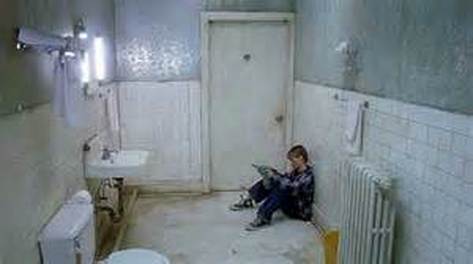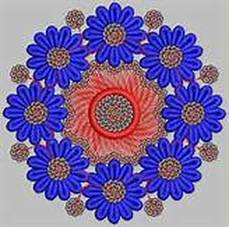|
Once when I was driving, I saw a man asking for money with a sign that read, “I have three toes- please help.” For an instant, my heart twinged with compassion. But that was immediately followed by a disorienting surprise as I reconsidered his sign.
He needs money because he has three toes? I immediately thought of Aimee Mullins. Aimee Mullins had both legs amputated when she was one year old. Rather than adopt the identity of a disabled person, she became a star athlete, a model and an inspirational speaker who empowers her listeners to transcend limited thinking and limited identity. I don’t mean to be uncompassionate to the man with three toes who needed some money, or to imply that it’s no big deal to lose a part of your body. I want to bless that man that he should have relief from any suffering caused by his body or anything else. But the real disability, as Aimee Mullins and countless others have demonstrated, is not in how many toes or legs you have, but how imprisoned you are by your thoughts. If you narrate your life in negative terms, telling yourself sad stories of victimhood, then that will be the lens through which you live, and that is what will seem to manifest. On the other hand, if you refuse to accept limiting labels, if you refuse to identify with negative stories, is there any fixed limit to what you can accomplish? In this week’s reading, Parshat Sh’mini, the Torah narrates the climax of the inauguration ceremony for the priests. Moses tells the Israelites that after the various offerings are brought- “Hayom Hashem nir’ah aleikhem- “Today Hashem will appear to you!” The offerings are brought, the rites performed, and then it happens- “Vayeira kh’vod Hashem el ha’am- “The glory of the Divine appeared to the people!” Then something tragic happens: in the ecstasy of the moment, the high priest Aaron’s two sons, Nadav and Avihu, break ranks and rush forward to offer their own incense. A fire streams forth from the Divine and kills them. Moses tells Aaron that Hashem is sanctified and honored by their death. Of Aaron it says- “Vayidom Aharon- Aaron was silent.” There’s a story of the Hassidic master Reb Menachem Mendel of Kotsk, the Kotsker Rebbe. One day, the son-in-law of Reb Shlomo of Radomsk was visiting him. The Kotsker asked his guest to please tell some Torah from his saintly father-in-law, to which he replied with this teaching: “When Aaron lost his two sons, the Torah records his praise, saying- ‘Vayidom Aharon- Aaron was silent’ because he was able to accept his misfortune with equanimity and not become a victim. But King David surpassed him and reached an even higher level, as he says in the psalm- ‘L’man y’zamerkha khavod v’lo yidom- ‘So that I may sing of Your glory and not be silent’- -for even in times of great distress he would still sing God’s praises.” This teaching, though somewhat extreme, points to the power of your mind to define the way you frame reality. It also hints at the two basic practices for learning to use your mind. The silence of Aaron hints at meditation. Through meditation, you learn to free your mind from all the thought forms that tend to imprison most people to some degree. The praise of David indicates prayer. In prayer, the sacred dimension that’s revealed in meditation is given expression. These two basic practices together- meditation and prayer- tap into the sacred dimension and draw forth Its nourishment into expression. The name of this parshah is “Sh’mini” which means “Eighth.” This refers to the eighth day of the ceremony on which the action takes place. The number eight symbolizes infinity, both in its Arabic shape and in its Hebrew meaning as the number that transcends seven, which is the number of finite creation. One of the names of God in Kabbalah is Ayn Sof, which also means Infinite- literally “there is no limitation”. Thus, the Infinite appears to the Israelites on the day of infinity. And when is the “day of infinity” as it applies to each of us? “Hayom Hashem nir’ah aleikhem- today Hashem will appear to you!” Today, of course, means now. In the subsiding of thought, there’s the subsiding of time. In the subsiding of time, there’s the blossoming of the only Reality there is- the Reality of this moment, the one and only moment. This moment is not fixed. Ever changing, it is Ayn sof, without limit, unbound by past and future. On this Shabbat Sh’mini, this Sabbath of the Infinite, let us co-create this moment not as victims of the many mishaps and tradgedies that unfold in time. But rather, from the silent depths of our being, let the voice of God emerge through our voices to praise Its own Mystery…
0 Comments
Last week, I accidentally locked myself in the bathroom.
The doorknob had broken a few days before. I went in to use the bathroom, and when I was finished, I realized I couldn’t get out. Dang. I took the screen out of the window, but soon realized that if I tried to squeeze my body through that tiny opening, I would not only be stuck in the bathroom, but stuck halfway though the window. Not a good plan. I had no regular tools- only a bunch of various pieces of doorknob lying around the bathroom. So, I grabbed a piece of metal and started bashing the doorknob as hard as I could. That didn’t work. Only one thing left to do- Stop. Look. Sitting there and looking carefully, I could see something that looked like a lever inside the door hole in which the knob was recessed. I found a metal thing which fit right inside and carefully pushed the lever thing. The doorknob released and it came right open. It was a good test, and a perfect reminder of the importance of Presence in the midst of the absurdities and challenges of life. There are three phases for dealing with absurdities and challenges. This week’s reading, Parshat Tzav, begins with a description of the Olah- the “elevation” offering that the priests are to perform: “… olah al mokdah… kol halailah ad haboker- “…the elevation offering should stay on the flame all night until morning.” If you want to live an “elevated” life, let the "night" of challenges be reminders to remain alert. Keep the "flame burning all night long." This is the first stage. Then it says the Kohen- the priest- must take the ashes of the offering and remove them to a place outside the camp. In other words, after you’ve burned through the negativity and come out the other end, completely let go of it. Don’t keep it around by creating mental stories about it; let it out of your space. This is the second stage. Then it says that the Kohen should kindle wood on the altar in the morning as well. The fire is called: “… aish tamid- a continual flame- lo tikhbeh- it should never be extinguished.” In other words, after the challenge is over and you’ve let go of it, you’ve got to still practice being conscious. It doesn’t work very well to get conscious only when things are challenging! And fortunately, it’s actually pretty easy to stay present in the many uneventful moments that comprise much of our lives- don’t take them for granted! That’s the blessing of the many prayers, sacred phrases and Divine Names you can use to come deeply into Oneness of the present moment, all day long. In the days of the Baal Shem Tov, it once happened at the conclusion of Yom Kippur that the sky was particularly cloudy. The moon was completely obscured, preventing the Baal Shem from making the blessing on the new moon that's traditionally chanted after Yom Kippur. The Baal Shem sensed that the welfare of his people somehow depended on his making the Kiddush Levana- the Sanctification of the Moon- that night. Determined, he stood beneath the night sky, concentrating his mind to cause the clouds to disperse, but with no success. He eventually accepted his failure as what needed to be, and retired to his room. His disciples, however, knew nothing of the Baal Shem’s sadness and had begun to dance around the house in ecstatic celebration. Eventually their revelry burst through the door into the Baal Shem’s room. In their mad ecstasy they took him by the hand and drew him into the dance. Later the Baal Shem noticed- the sky had cleared and the waxing moon beamed brightly. The Baal Shem made the brakha- the blessing- and averted the danger. On this Shabbat Tzav, the Sabbath of Connection, may we connect the three phases as the Baal Shem tov did- accepting challenge and even failure when it happens, letting go of negativity and opening to the joy of the Dance, and blessing the holiness of each moment, regardless of whether our fortune is "waxing" or "waning". Good Shabbos, Hag Purim Samayakh! This morning, I had yet another computer and IPhone breakdown- the latest in a string of digital tzures that has plagued me for the last few weeks. Thank God for my friend Ben! He figured it out and got me my back on my virtual feet- I'm so grateful for his expertise! I really needed his help.
Some kinds of help, however, are the opposite of help. Take my friend Josh, for example, who is blind. When he walks around in public, it’s not uncommon for someone to grab his arm aggressively and say, “Here let me help you!” and try to force him in a certain direction. No thanks! There are folks who psychologically need to help others. Their kind of help is often not really help- it’s simply food for their self image. It reminds me of an old Sesame Street episode, where Grover is straining to carry a really heavy brick. The brick has the word “HELP” carved into it. As he moans and groans trying not to drop the brick, he keeps yelling, “Help! Help!” The great trickster Ernie walks up and says, “Oh, Grover, you need some help? I’ve got some help for you, hold on just a minute.” He bends down and picks up another big heavy brick, also with the word “HELP” carved into it, and piles it on top of the first brick, increasing Grover’s burden. “HELP! HELP!” Grover yells louder. “Oh, you want more help??” says Ernie. Ernie then picks up yet another big heavy “HELP” brick and piles it on top of the two that Grover is already holding. This goes on a few more times- Grover yelling “Help!” and Ernie just making it worse and worse by piling on more and more HELP bricks. Finally, Grover just screams and falls backwards, all the bricks falling on top of him. Have you ever noticed a strong desire in yourself be the helper? Or, instead of needing to be the helper, have you felt that you needed to achieve something, or experience something, or be right about something? If you so feel strongly, you’ve got to check in with yourself- are you seeing clearly what’s needed, or are you unconsciously trying to satisfy your own need to be a certain way, achieve a certain goal or have a certain experience? The root of the problem is not helping or achieving or having. It’s identifying with what you’re doing. It’s seeing your “self” as the “doer.” When my daughter was three, she liked “helping” me cook in the kitchen. The “help” usually entailed holding my wrist while I stirred something in a hot pan, or holding my arm while I lifted something much too heavy and dangerous for her to lift. She felt like she was helping, but she wasn’t really the doer. That’s actually our situation. We go through motions, thinking “I am doing such-and-such,” but actually the act is being done by Everything- we’re only apparently doing it. When you turn on the car, it may seem like the key is turning it on. But is it the key? Is it the starter? Is it the spark plug? There’s no single thing doing anything; Everything is doing everything all the time. Yet we tend to think, “I am doing it”. In thinking of ourselves as doers, we take on the most profound burden of all. Like Grover, we strain and moan under the burden of life, yelling, “Help! Help!” But when it comes to the burden of being the doer, any “help” you get is ultimately like Ernie’s help. You don’t need that kind of help! You just need to drop the burden. But, you can’t “try” to drop the burden. That’s just more burden! The “me” that tries to drop the burden is itself the burden. So how do you drop the burden? This week’s reading, Parshat Vayikra, talks about how the various sacrificial offerings were performed. When bringing a sacrifice, it says that one should bring it- “… el petakh ohel mo’ed… yakriv oto lirtzono- “… to the opening of the Tent of Meeting… bring it close, willingly.” The word for “bring it close”- “yakriv”- is the same root as “korban”- the word for the sacrificial offerings. So the meaning of the offerings is not actually “sacrifice,” but “drawing close.” What is the Tent of Meeting? The “Tent of Meeting” is the place we meet Reality. Where is that? It’s always only where you are! But, just because you’re here now, doesn’t mean you’re connected to the Here and Now. You need to willingly come to this moment- “...el petakh ohel mo'ed yakriv oto lirtzono- "...draw near willingly and meet the openness of this moment.” Draw your attention willingly into the petakh- the "openness" that is the present. Don’t hold it as a burden that you need to change or control; offer yourself to it. That’s the key. There’s also a hint of this practice in the next verse- “V’samakh yado el rosh ha’olah- “One should lean one’s hand on the head of the burnt offering.” “Leaning” is the exact opposite of "carrying." To carry a burden, you have to put your hands under it. Here it says to lean on the korban- rest in the "drawing near." There's a quality of surrender, not an effortful quality- "...draw near willingly and meet the openness of this moment.” Let your awareness simply dwell with Reality as it’s appearing now. That’s letting go. As long as you don't let go, the message will continue to come. It will come in the form of whatever situations arise, over and over again. As it says in the first verse of our parshah- “Vayikra el Moshe- “Called to Moses.” It doesn’t say who called to Moses, it just says “called”. The last letter of the word Vayikra- “Called”- is the letter Alef. Alef has the numerical value of one, and in Kabbalah, it’s also a symbol of the Divine Oneness. On a Torah scroll, this particular Alef is written smaller than all the other letters, hinting that the “Oneness” is hidden within everything, calling to us from everything, nudging you to see- it's not you who acts. When you can see that it’s not you who acts, but the Divine Oneness that is Everything, you can let go of your burden. Then, the help you offer is also not a burden- it doesn’t demand anything in return, or push anybody around. It becomes a true gift- a Divine gift- with no strings attached… There’s a story of Rabbi Baruch of Mezbizh, that once he was saying the blessing after his meal. When he got to the following passage, he repeated it three times with great fervor- “V’na al tatzrikheinu, Adonai Eloheinu, lo lidei matnat basar v’dam, v’lo lidei halvatam, ki im l’yadkha hameleiah hap’tukha kak’dosha v’harkhavah… “Please let us not need the the gifts of flesh and blood, nor their loans, but only your full, open, holy and generous hand…” When he finished, his daughter asked- “Abba, why did you pray so hard that you should not need the gifts of people? Your only livelihood comes from the gifts people bring you out of gratitude!” “My daughter,” he replied, “You must know that there are three ways of bringing gifts to the tzaddik. The first way is when a person thinks, ‘I’m a generous person, so I’ll bring a gift.’ This way is referred to by the words, ‘let us not need the gifts of flesh and blood.’ “The second way is when a person thinks, ‘I’ll give something now, and then I’ll get some reward in the future.’ Those people want heaven to pay them interest- that’s the ‘loan.’ “But there are some who know- ‘God has put this money in my hand to give, and I’m just the messenger.’ These are the ‘full, open, holy and generous hand...’” On this Shabbat Vayikra, The Sabbath of Calling, may we hear message of Oneness that calls from all things, urging us to drop the burden of separateness and be messengers of the Divine compassion and generosity in this world... Good Shabbos!!! This week’s reading recounts the building of the Sanctuary-
“Eleh p’kudei HaMishkan… “These are the remembrances of the Sanctuary…” (Ex. 38:21) Remember- right now- make yourself into a sanctuary! How do you do that? It goes on to say: “Mishkan HaEidut… “The Sanctuary of Witnessing…” The moment you become the witness to what’s happening, seeing without judgment or resistance, your inner space becomes a Sanctuary of Presence. The parsha then goes on to describe the builders and artisans, including one named Oholiav, who is described as a “carver, weaver and embroiderer.” A Carver: To become a Mishkan HaEidut, a Sanctuary of Witnessing, first let your inner space be “carved” by the content of this moment. What do you see? What do you hear? What do you feel? Don’t resist, let your inner space take the form of this moment. A Weaver: Then, let the fullness of everything in this moment be “woven” into a whole within the space of your awareness. Don’t tear the moment apart with judgments and resistance- it’s already one whole tapestry, when you allow it to be. An Embroiderer: Let your own thoughts/words/actions “embroider” the sacred. Give your thoughts a form with a Divine Name or sacred phrase, letting it vibrate repeatedly in your mind. Try this phrase, which means, “The Glory of the Divine Presence Fills”- Kavod Hashem Malei! Kavod Hashem Malei! This phrase is from the following verse which describes how the Sanctuary was so full of Presence, Moses could not enter- “Moses could not enter the Sanctuary… for the Glory of the Divine Presence filled the Sanctuary.” (Ex. 40:35) When your presence completely fills this moment, there's no more room for the separate “me”- there’s just the Presence, not separate from anything… On this Shabbat Pekudei, the Sabbath of Remembrance, may we remember this most fundamental sacred task, clearing the way for joy and celebration in this new month of Adar II, the month of Purim... Hodesh Tov! Good Month to you! Mishei Nikhnas Adar Marbim Simkha! When the month of Adar enters, joy increases! I started college in the late summer of 1987, at the Eastman School of Music in Rochester, New York.
Although I was brought up without any religious practice at home, a spontaneous experience of spiritual awakening that summer led me to want to explore traditional Judaism just as I was beginning college. So what did I do? Of course, I contacted Chabad… on Friday afternoon at about 4 pm! And, I had no way of getting to the rabbi’s house, so I asked if he would pick me up. Of course, asking an observant Jew to drive across town and pick you up right before Shabbos is not exactly the polite thing to do… but I didn’t know! The rabbi drove out to pick me up, giving me the “hurry up!” look as I walked toward his car from the dorm entrance. I got in the car and he sped off. “Hi, I’m Brian,” I said. “How are you?” “Thank God” he said. I thought that was an odd response to the question. But as I got to know the Jewish religious community more, this was of course the standard response- “How are you?” “Thank God!” “How’s your family?” “Thank God!” “How’s work? School? Whatever?” “Thank God!” It can sound funny if you’re not used to it. And, if you are used to it, it might sound formulaic, or dishonest. But it has a profound spiritual basis: In Hebrew, the most sacred Name of God consists of the letters that form the verb “to be” in all three tenses. So although God is often pictured as a deity, this is metaphor. The Name doesn’t mean a deity, a being among beings- not even the greatest of all beings. It just means Being. I means Reality. So when you say, “Thank God,” it also means “Thank Everything” and “Thank Everyone,” since nothing is separate from God. It downplays the individual and instead focuses on the Whole. The religious person acknowledges: “I am not the cause, I am the effect. I am a tiny phenomenon in an Infinite Ocean of happening. The Infinite is responsible, not me.” Why so much linguistic effort to downplay the individual “I”? The Maggid of Zlotchov (1) taught on a verse (2) in which Moses is recounting the giving of the Ten Commandments. Moses says- “Anokhi omed bein Hashem uveineikhem- “I stood between the Divine and you…” The Maggid interpreted like this- “The ‘I’ stands between us and God. When you say ‘I,’ a wall stands between you and God. But for one who offers the ‘I’- there is no barrier. And this is what the words in the Song of Songs are referring to- ‘I am my Beloved’s and my Beloved’s desire is toward me’- when my ‘I’ has become my Beloved’s, then it’s toward me that my Beloved’s desire turns.” But if the “I” stands between “me” and the Beloved, between “me” and Reality, than who is “me”? Of course, the “me” is also Reality! God is also the awareness that looks through your eyes, seeing Itself everywhere. Remember that everything is God, and you can be instantly and effortlessly reunited with the Beloved. It’s not that God has gone anywhere- there’s nothing but God, only we become so used to It! It’s like walking with a lover, hand in hand. At first, you’re on fire with love. But, if you keep walking, at some point you start to think about something else. Eventually you wouldn’t even notice that you’re holding hands! To be reunited, in such a case, is to become aware of what is already present. In the opening verses of this week’s reading, Moses instructs the people of Israel (3): “Sheishet yamim te’aseh melakha- “Six days shall work be done…” It doesn’t say, “Six days you shall work (ta’ase),” but rather “Six days work shall be done (te’ase).” The passive form suggests that a person should not identify with the work (4); there should be no sense of “I am doing this work”. It then says- “… uvayom hashvi’i yiyeh lakhem kodesh, Shabbat Shabbaton- “… and on the seventh day it shall be holy for you- a Sabbath of Sabbaths.” It doesn’t say there should be a Sabbath among the six weekdays, but a Sabbath among Sabbaths! Meaning, even the weekdays should be Sabbaths, in a sense. Work is being done, but there should be no sense of a “me ” doing the work. There is only the One Doer, and the One includes all the different beings playing their different roles. That’s why one of the Divine Names is Elohim, which is a plural word, meaning “powers”. God is the many in the One. This also explains the deeper meaning of a quite disturbing part of the verse: “…Shabbat Shabbaton Lashem, kol ha’oseh vo melakha yumat- “… A Shabbat of Shabbats to the Divine- all who work on it shall die!” On the surface it seems to be saying that if a person does work on Shabbat they will die or be executed. But there’s a different way to read the verse- not “whoever does work on it shall die,” but rather, “whoever does work, on it shall die.” In other words, the “doer” of work during the week- the “I” that thinks it’s the doer- should “die” on Shabbat. If you can put yourself to death as the “doer” on Shabbat, this opens the possibility to disidentify with the “doer” on weekdays as well. Then all of life is Shabbat. That’s liberation. Try it- Say “Thank God” or “Barukh Hashem” frequently, even just mentally. Every time you do anything, remind yourself- your strength is a gift. Your intelligence is a gift. Even the desire to do anything at all is a gift. It all comes from beyond the “I.” Everything comes into being through an infinite string of efforts from an assembly of countless beings. And yet, there’s only one person who can command this awareness for you, and that’s you! That’s the paradox- on one hand, you do nothing- it's all Hashem. On the other, only you can decide to open to this awareness. How do you open to it? Like Moses, you must assemble the entire assembly of Being before your mind in each moment- “Vayakhel Moshe et kol adat- “And Moses assembled the entire assembly (4)…” And then, knowing that everything in Existence- every face you greet, every creature you encounter- is the Face of the Divine, acknowledge- “Barukh Hashem!” May this Shabbos be a Shabbat Shabbaton; may we surrender our “I” to the “Beloved” and know the One who is both Doer and Doing, both One and Many. May this realization spill over into all moments and may the world be swiftly healed from the abuses and distortions caused by the endlessly hungry “me.” May true peace come now! Kein y’hi ratzon, Amein! 1. The Maggid of Zlotchov was the 18th century Hassidic master Rabbi Yekhiel Mikhel 2. Deut. 5:5 3. Ex. 35:2 5. From the teachings of Rabbi Menachem Shneerson 4. Ex. 35:1 |
Archives
July 2024
|





 RSS Feed
RSS Feed